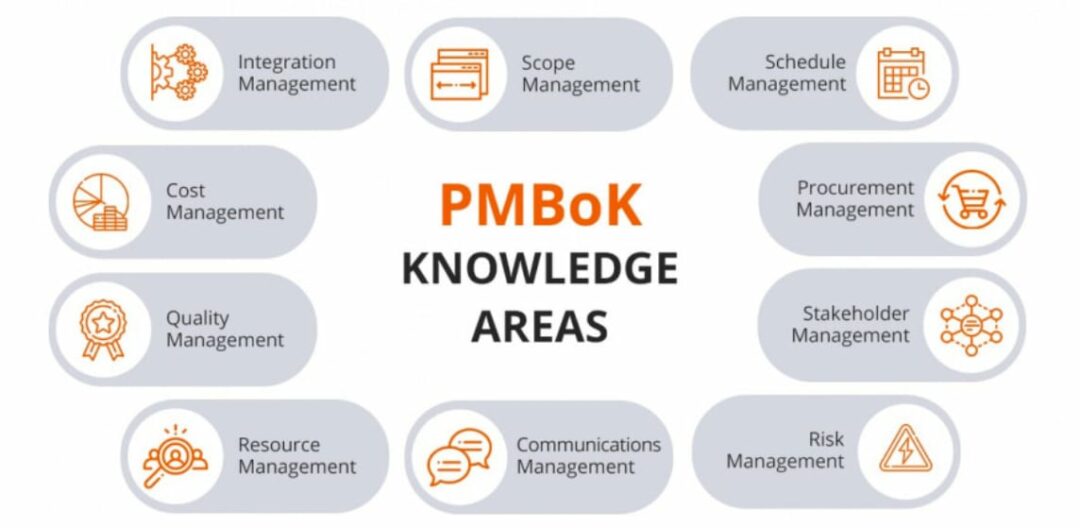5 key project management knowledge areas and why they matter
Blog: Monday Project Management Blog
Apparently the definition of knowledge is, “something that is learned and understood.” Which in the context of project management, sounds like:
a. A never-ending journey
b. A lot of hard work
Even Plato said, “The learning and knowledge that we have is, at the most, but little compared with that of which we are ignorant.”
Cheers Plato.
One thing I know, is never to rely on Ancient Greek philosophers for a quick pick-me-up.
Thankfully, the kind people over at the Project Management Institute (PMI) decided to help out a little by defining the distinct project management knowledge areas you have to wrap your head around.
This article will focus on the 5 key project management knowledge areas for project success and give highlights of the other 5. So you’ll be one step further along on your knowledge journey and Plato can eat his shorts.
What are the key project management knowledge areas?
The PMI ‘Bible’ — the Project Management Body of Knowledge (PMBoK) — refers to 10 key project management knowledge areas.
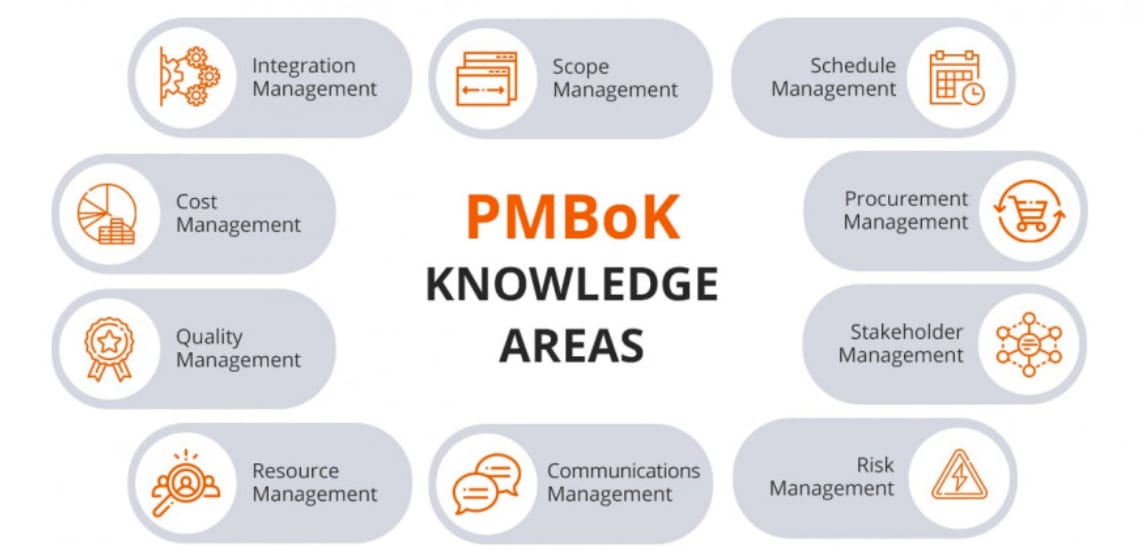
The PMBoK is helpful as it brings a standardized, and repeatable, approach to project management which means you get to profit from the lessons (read: mistakes) others made before you.
If you apply the learning from the 10 knowledge areas you’ve got a pretty good chance of a successful project.
Some key benefits that come from following a tried-and-tested project management process such as this are:
- Improved organization. The PMBoK knowledge areas tell you, pretty comprehensively, what you should be doing throughout the lifecycle of your project. They signpost you to key documentation that should be completed and to which tools and techniques can help.
- Project transparency. Using documents such as the project charter and project plan helps bring clarity to the project. The project charter details the intended project objective, project scope, and key project deliverables so everyone should be clear on what the project is trying to achieve, and how.
It also lays out the roles and responsibilities of business stakeholders and the project team so everyone knows who’s accountable for what.
- Effective control. There are a number of the project management knowledge areas that focus on monitoring and control. Whether that’s project schedule or cost management, or making sure you’ve detailed the change control process as part of your project integration management, they’ve got you covered here too.
As we know,* the most important things to focus on for project success are time, scope, and cost.
I’d suggest it’s also worth knowing the overall point of the project and who else you need to convince to hop aboard the good ship ‘Project’ for the journey.
But let’s move on. This article will concentrate on the 5 most important PM knowledge areas:
- Project Integration Management
- Project Scope Management
- Project Schedule Management
- Project Cost Management
- Project Stakeholder Management
*If you don’t know, check out our article on the ‘iron triangle’ of project success factors.
Why are these 5 the most important?
Only 43% of projects are delivered within budget. Statistics concerning project duration make for even worse reporting — only 29% of projects run to time.
So, while all knowledge areas are important, it makes sense to tackle these 2 areas, along with the third side of the iron triangle — scope — as a priority.
And the project integration management area is where most of the key project documentation is completed to support the effective running of the project. Without a project charter detailing the objective of the project and its key deliverables, it’s pretty hard to judge success.
Something like this, from monday.com:
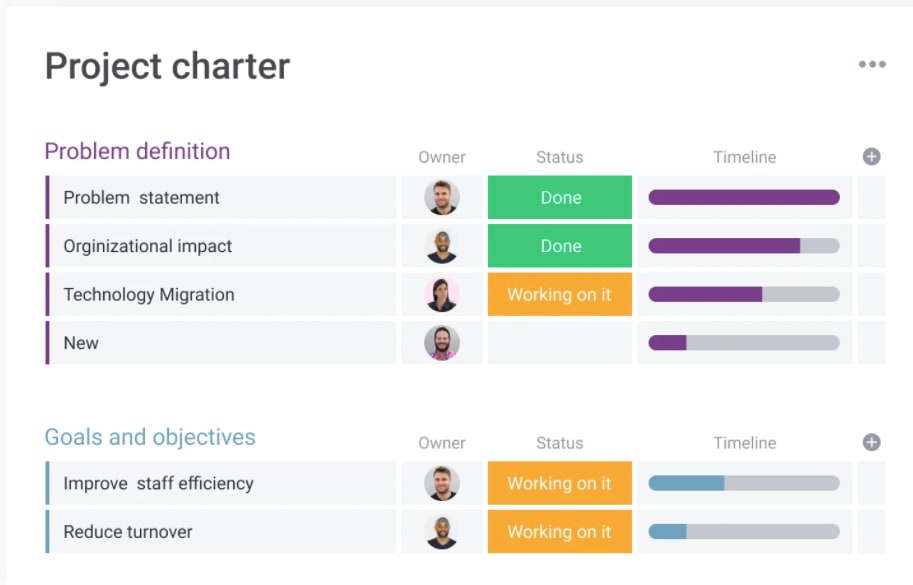
Finally, people — possibly the biggest factor in whether the project is successfully implemented and goes on to deliver its expected benefits or sinks into oblivion like Taylor Hicks’ debut single (yep, you’ll probably have to Google it).
Ok, so we’ll tackle the 5 knowledge areas that deal with those 5 factors in project success.
1. Project integration management
This knowledge area is all about the elements that help the project hang together as a whole. It covers the approach to managing all the phases of the project lifecycle including project planning, directing and monitoring work, and closing down the project.
It also details the change control process where change requests that occur during the project are evaluated, approved and recorded.
2. Project scope management
This knowledge area is all about managing the scope of the project. The way you plan to approach that should be written down in your scope management plan.
Before you can decide how to manage your scope you’ll need to create a project scope statement which details what will be delivered by the project and, more importantly, what won’t be. To form your scope statement you’ll need to gather project requirements from the business.
This knowledge area is critical, as scope creep is a real issue in projects and affects the project timeline and budget, and the ability to effectively manage resources.
There are, of course, occasions where the project scope does need to change mid-project which is why it’s so important to have an effective change control process.
3. Project schedule management
During the planning phase of the project lifecycle, the project manager has to create the project schedule. This involves taking the agreed project scope and breaking it down into a task list.
For each task the project manager has to agree a start and finish date and the budget. You’ll then need to order the tasks by working out the relationships between the tasks and whether any are dependent on each other.
Understanding how long each task will take and the relationship between them, helps to identify those tasks where there’s some wiggle room as to when they’re delivered and those which are on the critical path. Tasks on the critical path have to be delivered on time or the whole project timeline is affected.
Earned value analysis is conducted during the project execution phase to determine if the project is on track to deliver within budget and schedule.
4. Project cost management
Cost management is critical to keeping your project within budget. Happily, as a knowledge area it’s one of the simplest to understand. There are no acronyms and no fancy analysis tools.
It’s just a case of:
- Estimating the cost of the project tasks
- Determining the project budget based on your identified costs
- Controlling cost throughout the project lifecycle
You’ll note that I said simplest. As in, uncomplicated. I didn’t say it was easy to do…
5. Project stakeholder management
During the project initiation phase, you should spend a significant amount of time identifying and analyzing project stakeholders. This analysis should include plotting key stakeholders on an influence vs. interest matrix to determine your key supporters and also those who are less keen.
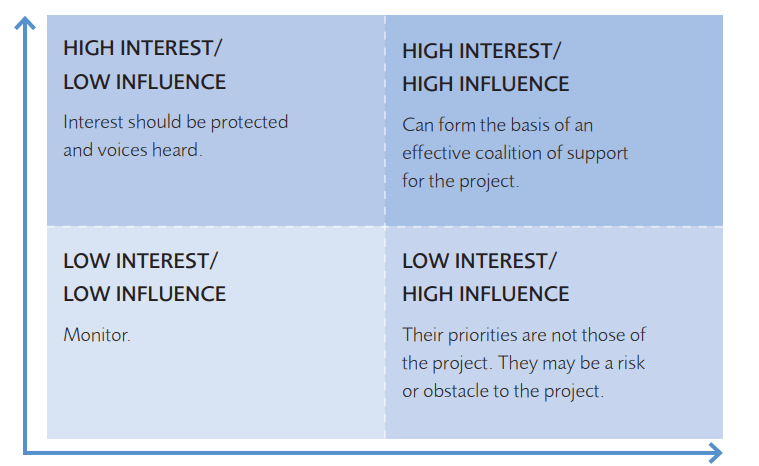
Once the project is underway, you’ll use your project communication plan — something like the template below — to engage stakeholders and keep them up to date with project progress.

What about the other 5?
Alright fine. Just for completeness, the other 5 project areas are…
1. Project Quality Management.
The desired quality of the output can have a significant influence on project time and cost. It’s important to decide the quality level and standards at project initiation phase. It should be clear if the business is looking for Ferraris or Fords. No offense Ford.
2. Project Resource Management.
This knowledge area is all about getting the right team in place, tracking their performance, building team cohesion, and motivating them to success.
Good resource management is one of the most challenging areas of project management. Make it easier with this resource management template from monday.com
3. Project Communications Management.
Having identified your stakeholders, you need to build a plan to communicate effectively with them through the project lifecycle. During project execution you’ll be putting your communications plan into action and monitoring it to make sure it’s making a difference.
4. Project Risk Management.
This knowledge area is about the identification, prioritization and mitigation of risks. You’ll need to capture all identified risks in the project risk register. Struggling for inspiration? Write down scope creep, project delay and going over budget. It happens in over 50% of projects.
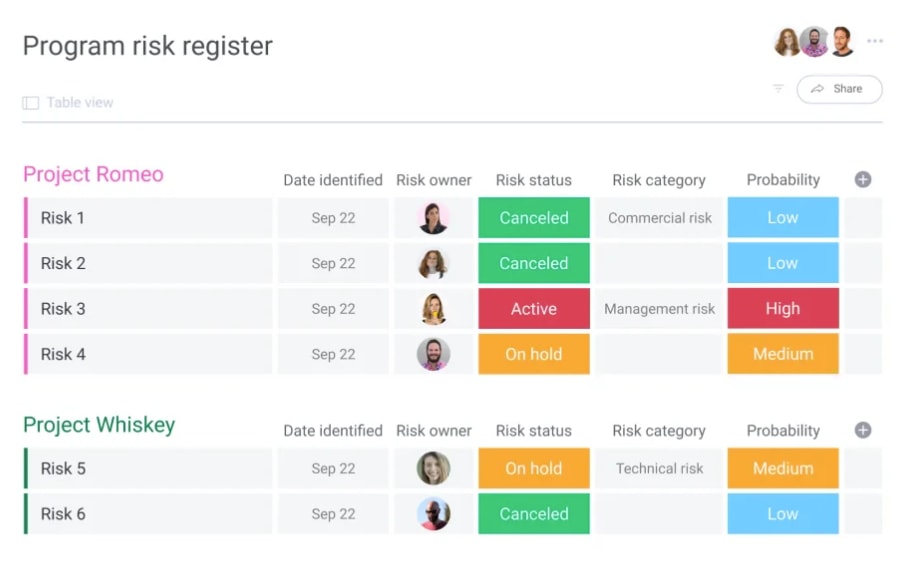
5. Project Procurement Management.
This is about planning when, and how, the project would procure resources or services to support the project. The rest of the knowledge area details how to conduct and control the procurement process.
Conclusion
And there you have it, the complete list of project management knowledge areas. It’s a lot to keep track of, which is where project management software can really add value.
For knowledge, like most things in life, it’s not just that you have it, it’s what you do with it that counts.
Using a complete Work OS like monday.com provides the tools you need to take your knowledge and turn it into action. We offer over 200 fully customizable templates that cover all 10 of the project management knowledge areas and make them easy to manage.
Why not kick off your project integration management with our project roadmap template?
The post 5 key project management knowledge areas and why they matter appeared first on monday.com Blog.
Leave a Comment
You must be logged in to post a comment.
